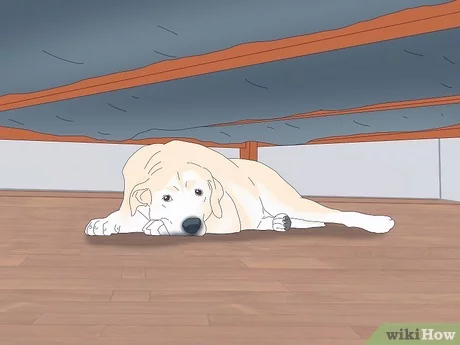Why Is My Dog Panting At Night
Why Is My Dog Panting at Night? Tips to Help Your Pup Sleep Better
If you’re a dog owner, you know how important it is for your furry friend to get enough rest. Dogs need sleep to stay healthy, happy, and alert. However, if your dog is panting at night, it can be hard for both of you to get a good night’s sleep. In this article, we’ll explore some common reasons why dogs pant at night and offer some tips to help your pup sleep better.
What Causes Nighttime Panting in Dogs?
There are many possible causes of nighttime panting in dogs, some of which may require medical attention. Here are some of the most common reasons why your dog might be panting at night:
1. Heat: Dogs regulate their body temperature by panting, so if they’re too hot, they’ll pant more. This can happen if the room is too warm or if your dog has a thick coat or is overweight. Make sure your dog has access to fresh water and a cool place to rest.
2. Anxiety: Dogs who are anxious or stressed may pant more, especially at night when they’re alone or in unfamiliar surroundings. Separation anxiety, noise phobia, or fear of thunderstorms or fireworks can all trigger panting.
3. Pain: Dogs who are in pain may pant more as a way to cope with discomfort. Arthritis, dental problems, gastrointestinal issues, or injuries can all cause pain that affects your dog’s sleep.
4. Respiratory problems: Dogs with respiratory issues such as asthma, bronchitis, pneumonia, or heart disease may pant more due to difficulty breathing. If your dog has a cough, wheezes, or gasps for air while sleeping, consult your vet.
5. Medications: Some medications can cause side effects such as increased thirst and panting in dogs. If your dog recently started taking a new medication, check with your vet to see if this could be the cause.
How Can You Help Your Dog Sleep Better at Night?
Once you’ve identified the possible cause of your dog’s nighttime panting, you can take steps to help them sleep better. Here are some tips that may help:
1. Keep the room cool: If heat is a factor, make sure the room where your dog sleeps is well-ventilated and not too warm. Consider using a fan or air conditioning if necessary.
2. Provide a comfortable bed: Make sure your dog has a comfortable and supportive bed that’s appropriate for their size and age. Older dogs may benefit from orthopedic beds that cushion their joints.
3. Reduce anxiety triggers: If your dog is anxious, try to reduce the triggers that cause stress. This may involve desensitization training, music therapy, or pheromone products that mimic calming scents.
4. Manage pain: If your dog is in pain, talk to your vet about pain management options such as medication, supplements, or physical therapy.
5. Address respiratory issues: If your dog has respiratory problems, follow your vet’s advice on treatment and monitoring. In some cases, oxygen therapy or surgery may be necessary.
6. Adjust medications: If a medication is causing panting, ask your vet if there’s an alternative drug or dosage that could be used instead.
Conclusion
Nighttime panting in dogs can be caused by many factors, but it’s important to identify the underlying cause to help your pup get better sleep. By keeping the room cool, providing a comfortable bed, reducing anxiety triggers, managing pain and respiratory issues, and adjusting medications if needed, you can improve your dog’s quality of life and strengthen your bond with them. Remember to consult with your vet if you have any concerns about your dog’s health or behavior. Sweet dreams!



